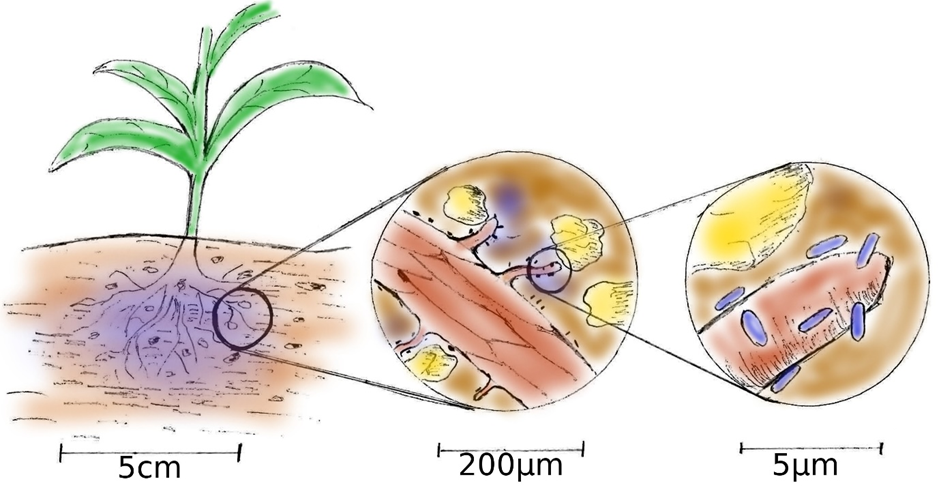Importance of using bacteria to promote wheat growth
The use of microorganisms in agriculture has been gaining prominence, aiming at increasing productivity, associated with sustainability and improving soil quality. The plant growth-promoting bacteria, in addition to improving the microbiological characteristics of the soil, act in the development of the plant in different ways throughout its growth process.
When inoculated via seed, these microorganisms have easy access to the tender tissues of the primary roots and root hairs, colonizing spaces inside and outside the root cells, in addition to adhering to soil particles and organic matter, colonizing the rhizosphere region.

Fonte: Helmholtz – Centro de pesquisa ambiental
This primary association ensures that the multiple mechanisms of growth promotion, originating from microorganisms, influence at various times in the development of the wheat crop. Bacteria of the genus Azospirillum stimulate the multiplication and growth of cells via the action of plant phytohormones and help in the fixation of atmospheric nitrogen. This action reflects in greater development and root exploitation and increase in shoot height and leaf area, increasing the photosynthetic area and, consequently, the carbon assimilation of the inoculated plant.
As the photosynthetic rate increases, the plant has a greater demand for water and nutrients. The increase in root volume, mediated by hormonal mechanisms of growth promotion, helps in the exploration of the soil in search of water and in the absorption of nutrients. In this way, the roots better exploit the soil, optimizing the interception and absorption of poorly mobile nutrients in the soil solution, such as phosphorus, calcium, magnesium, copper, iron and zinc.
In addition to improving soil exploration, bacteria of the Pseudomonas genus are able to acidify the rhizosphere region, releasing phosphorus molecules attached to organic matter. This allows the plant to absorb the molecule and use it in its metabolism in enzymatic processes, biosynthesis and electron transfer, among other actions in which phosphorus is an essential element.
When we opted for foliar inoculation in the tillering of the crop, in addition to the usual environmental influence (temperature and humidity), bacterial colonization is dependent on the entry ports existing in the inoculated leaf. Because of this, bacteria that are more sensitive to environmental conditions, such as Azospirillum, do not have the same growth promotion efficiency as when inoculated via seed.
Thus, bacteria more tolerant to unfavorable environmental conditions, such as Pseudomonas, show adaptability to colonization via foliar inoculation. And, when we combined the two microorganisms (Azospirillum and Pseudomonas), we observed a compensation of Azospirillum sensitivity thanks to Pseudomonas tolerance, reflecting the active growth promotion of both microorganisms. These characteristics, associated with other growth promotion mechanisms resulting from these associations, reflect an increase in production and productivity.
The association with these microorganisms has resulted in an increase in productivity between 5% and 8%, using microorganisms alone or in combination in scientific trials conducted at the 3tentos research center.
The improvement of the microbiological characteristics of the soil brings significant benefits throughout the seasons, recovering and preserving characteristics that guarantee the health of the soil. The use of biological products is an important aid in maintaining the health of the soil and plants, associating with roots and leaves, promoting growth while acting on more permanent characteristics, such as organic matter and soil structuring. In this way, the use of biologicals also helps to colonize the rhizosphere, helping to control pests and pathogens that negatively affect production.




